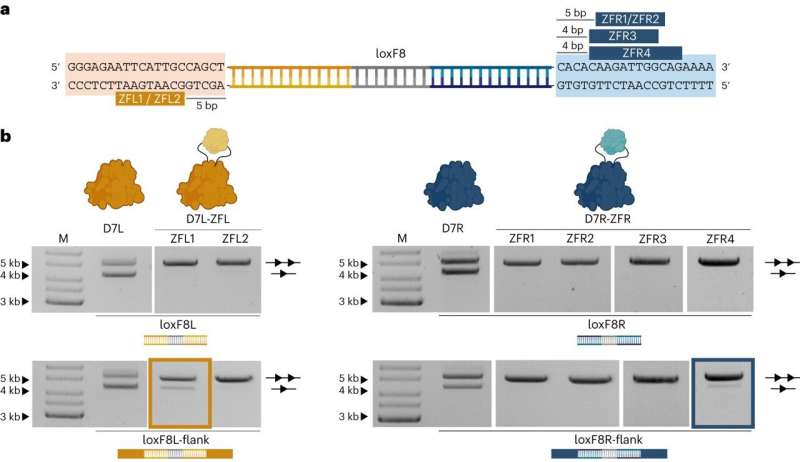This article has been reviewed according to Science X's editorial process and policies. Editors have highlighted the following attributes while ensuring the content's credibility:
fact-checked
peer-reviewed publication
trusted source
proofread
New genome editing tools unlock possibilities for precision medicine

A team of researchers at the Carl Gustav Carus Faculty of Medicine, University of Technology Dresden, led by Prof. Frank Buchholz, has achieved a major breakthrough in genome editing technology. They've developed a cutting-edge method that combines the power of designer-recombinases with programmable DNA-binding domains to create precise and adaptable genome editing tools.
The research is published in Nature Biotechnology.
Traditional genome editing faced limitations in achieving ultimate precision until now. Prof. Buchholz's team has broken through this barrier by creating what many have sought: A zinc-finger conditioned recombinase. This innovative approach involves integrating a zinc-finger DNA-binding domain into specially designed recombinases. These enzymes remain inactive until the DNA-binding domain engages with its target site, adjacent to the recombinase binding area.
The significance of this achievement lies in the fusion of two key strengths—the targeting ease of programmable nucleases and the precise DNA editing capabilities of recombinases. This advancement overcomes existing limitations in genome editing techniques and holds vast promise for therapeutic gene editing and various biomedical applications.
Prof. Buchholz states, "This breakthrough represents a harmonization of existing genome editing tools, allowing us to create precision enzymes independent of natural DNA repair mechanisms. This marks a significant step towards a safer and more adaptable approach of correcting disease-causing genetic mutations, offering immense benefits for numerous patients."
This pioneering work opens new horizons in genome surgery and promises a safer, more precise approach to treating genetic disorders. The implications of this development extend far and wide, potentially transforming the landscape of medicine as we know it.
Professor Esther Troost, the Dean of the Faculty of Medicine at TU Dresden, says, "The Faculty of Medicine at TU Dresden is setting new standards for innovative medicine with groundbreaking genome editing tools. Under the leadership of Prof. Frank Buchholz, the research team is breaking traditional boundaries and paving the way for specialized gene therapy applications."
Building upon these advancements, Seamless Therapeutics GmbH, a biotechnology company founded out of the Buchholz lab, will advance these innovative findings to therapeutic application. The company has signed an exclusive licensing agreement with the TU Dresden for this novel technology that allows Seamless to further expand their recombinase platform to change the paradigm of gene editing and develop a pipeline of disease-modifying product candidates across a broad spectrum of indications.
More information: Liliya Mukhametzyanova et al, Activation of recombinases at specific DNA loci by zinc-finger domain insertions, Nature Biotechnology (2024). DOI: 10.1038/s41587-023-02121-y



















